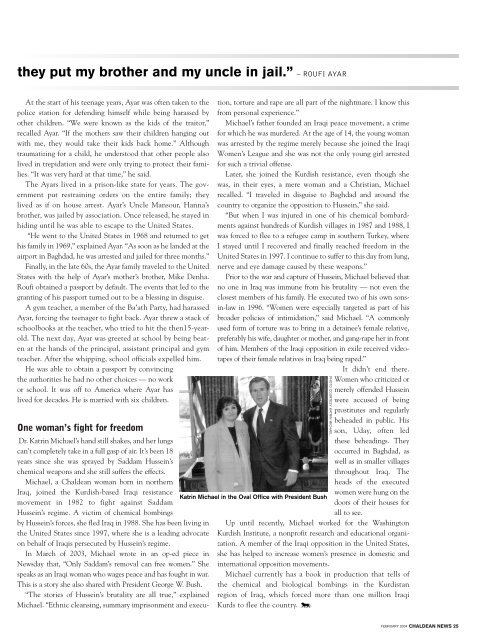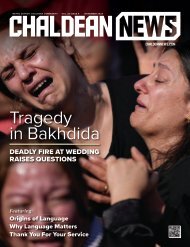Create successful ePaper yourself
Turn your PDF publications into a flip-book with our unique Google optimized e-Paper software.
they put my brother and my uncle in jail.” – ROUFI AYAR<br />
At the start of his teenage years, Ayar was often taken to the<br />
police station for defending himself while being harassed by<br />
other children. “We were known as the kids of the traitor,”<br />
recalled Ayar. “If the mothers saw their children hanging out<br />
with me, they would take their kids back home.” Although<br />
traumatizing for a child, he understood that other people also<br />
lived in trepidation and were only trying to protect their families.<br />
“It was very hard at that time,” he said.<br />
The Ayars lived in a prison-like state for years. The government<br />
put restraining orders on the entire family; they<br />
lived as if on house arrest. Ayar’s Uncle Mansour, Hanna’s<br />
brother, was jailed by association. Once released, he stayed in<br />
hiding until he was able to escape to the United States.<br />
“He went to the United States in 1968 and returned to get<br />
his family in 1969,” explained Ayar. “As soon as he landed at the<br />
airport in Baghdad, he was arrested and jailed for three months.”<br />
Finally, in the late 60s, the Ayar family traveled to the United<br />
States with the help of Ayar’s mother’s brother, Mike Denha.<br />
Roufi obtained a passport by default. The events that led to the<br />
granting of his passport turned out to be a blessing in disguise.<br />
A gym teacher, a member of the Ba’ath Party, had harassed<br />
Ayar, forcing the teenager to fight back. Ayar threw a stack of<br />
schoolbooks at the teacher, who tried to hit the then15-yearold.<br />
The next day, Ayar was greeted at school by being beaten<br />
at the hands of the principal, assistant principal and gym<br />
teacher. After the whipping, school officials expelled him.<br />
He was able to obtain a passport by convincing<br />
the authorities he had no other choices — no work<br />
or school. It was off to America where Ayar has<br />
lived for decades. He is married with six children.<br />
One woman’s fight for freedom<br />
Dr. Katrin Michael’s hand still shakes, and her lungs<br />
can’t completely take in a full gasp of air. It’s been 18<br />
years since she was sprayed by Saddam Hussein’s<br />
chemical weapons and she still suffers the effects.<br />
Michael, a Chaldean woman born in northern<br />
Iraq, joined the Kurdish-based Iraqi resistance<br />
movement in 1982 to fight against Saddam<br />
Hussein’s regime. A victim of chemical bombings<br />
by Hussein’s forces, she fled Iraq in 1988. She has been living in<br />
the United States since 1997, where she is a leading advocate<br />
on behalf of Iraqis persecuted by Hussein’s regime.<br />
In March of 2003, Michael wrote in an op-ed piece in<br />
Newsday that, “Only Saddam’s removal can free women.” She<br />
speaks as an Iraqi woman who wages peace and has fought in war.<br />
This is a story she also shared with President George W. Bush.<br />
“The stories of Hussein’s brutality are all true,” explained<br />
Michael. “Ethnic cleansing, summary imprisonment and execution,<br />
torture and rape are all part of the nightmare. I know this<br />
from personal experience.”<br />
Michael’s father founded an Iraqi peace movement, a crime<br />
for which he was murdered. At the age of 14, the young woman<br />
was arrested by the regime merely because she joined the Iraqi<br />
Women’s League and she was not the only young girl arrested<br />
for such a trivial offense.<br />
Later, she joined the Kurdish resistance, even though she<br />
was, in their eyes, a mere woman and a Christian, Michael<br />
recalled. “I traveled in disguise to Baghdad and around the<br />
country to organize the opposition to Hussein,” she said.<br />
“But when I was injured in one of his chemical bombardments<br />
against hundreds of Kurdish villages in 1987 and 1988, I<br />
was forced to flee to a refugee camp in southern Turkey, where<br />
I stayed until I recovered and finally reached freedom in the<br />
United States in 1997. I continue to suffer to this day from lung,<br />
nerve and eye damage caused by these weapons.”<br />
Prior to the war and capture of Hussein, Michael believed that<br />
no one in Iraq was immune from his brutality — not even the<br />
closest members of his family. He executed two of his own sonsin-law<br />
in 1996. “Women were especially targeted as part of his<br />
broader policies of intimidation,” said Michael. “A commonly<br />
used form of torture was to bring in a detainee’s female relative,<br />
preferably his wife, daughter or mother, and gang-rape her in front<br />
of him. Members of the Iraqi opposition in exile received videotapes<br />
of their female relatives in Iraq being raped.”<br />
It didn’t end there.<br />
Women who criticized or<br />
merely offended Hussein<br />
were accused of being<br />
prostitutes and regularly<br />
beheaded in public. His<br />
son, Uday, often led<br />
these beheadings. They<br />
occurred in Baghdad, as<br />
well as in smaller villages<br />
throughout Iraq. The<br />
heads of the executed<br />
women were hung on the<br />
doors of their houses for<br />
all to see.<br />
Up until recently, Michael worked for the Washington<br />
Kurdish Institute, a nonprofit research and educational organization.<br />
A member of the Iraqi opposition in the United States,<br />
she has helped to increase women’s presence in domestic and<br />
international opposition movements.<br />
Michael currently has a book in production that tells of<br />
the chemical and biological bombings in the Kurdistan<br />
region of Iraq, which forced more than one million Iraqi<br />
Kurds to flee the country.<br />
Katrin Michael in the Oval Office with President Bush<br />
PHOTO COURTESY KATRIN MICHAEL<br />
<strong>FEBRUARY</strong> <strong>2004</strong> CHALDEAN NEWS 25

















